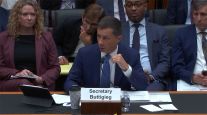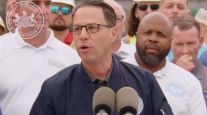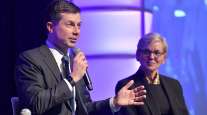Staff Reporter
Secretary Pete Buttigieg Suggests Usage Charge as Sustainable Funding Solution
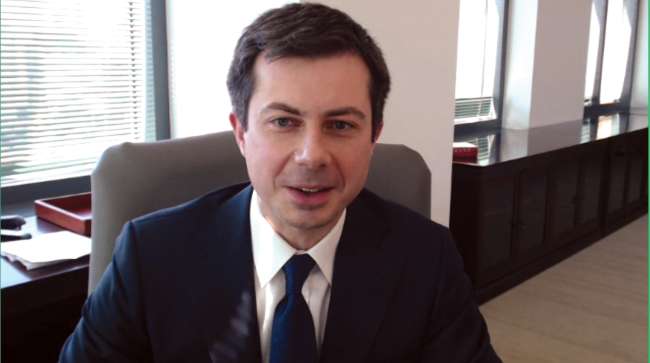
[Stay on top of transportation news: Get TTNews in your inbox.]
Transportation Secretary Pete Buttigieg acknowledged the lack of sustainable transportation financing sources, but suggested an increase to the federal fuel tax rate would not offer a long-term solution.
Buttigieg delivered one of his first public speeches as U.S. Transportation Secretary to a virtual meeting of the American Association of State Highway and Transportation Officials’ 2021 Washington Briefing on Feb. 25.
Due to increasing electrification of vehicles, Buttigieg recognized the gas tax is not a long-term funding solution and said he doesn’t think “that’s where the energy is going to be in Washington.”
Welcome to the final day of #AASHTOWB2021! @SecretaryPete gives the keynote address: "We've got to make sure everything we to drive this outcome - a safer transportation system for all Americans, no matter if we use cars, bikes, trains, or wheelchairs." pic.twitter.com/qerUGwH9qu — AASHTO (@aashtospeaks) February 25, 2021
In recent years, many states have taken steps to raise revenue, passing measures such as fuel tax hikes.
The federal fuel tax has remained at 24.4 cents a gallon for diesel and 18.4 cents a gallon for gasoline since 1993.
In terms of a sustainable funding mechanism, Buttigieg suggested the merits of a usage charge system — so long as privacy concerns could be addressed. He said federal leaders are open-minded about financing mechanisms, noting that any solution needs to be sustainable and predictable.
“If we’re committed to that view, then whether it’s upstream or at the vehicle level, some kind of road usage assessment is going to be necessary,” Buttigieg said. “The trouble is that nobody’s been able to present a version of that that fully resolves the privacy concerns and technical issues, but we certainly see some things being done, especially on the commercial side, that demonstrate that we can move in that direction.”
Highlighting equity and climate change as two key considerations for the Biden administration’s policies and investments, Buttigieg said the latest round of Infrastructure For Rebuilding America grants will take these tenets into account.
Buttigieg, who took questions from state department of transportation leaders during the session, said the transportation sector is the largest source of greenhouse gas emissions, meaning it has an important role to play in limiting such pollution.
In terms of reducing emissions, Federal Highway Administration Deputy Administrator Stephanie Pollack suggested shifting vehicles, including medium- and heavy-duty trucks and transit vehicles, toward electrification and other alternative fuels. However, Pollack, who participated in a panel discussion with federal transportation leaders after Buttigieg’s remarks, said electrification alone will not bring the transportation sector to net zero emissions. She identified increasing transit access and ridership and improving pedestrian and bicyclist infrastructure as ways to reduce carbon emissions.
Pollack also noted that certain practices that have become common during the pandemic, such as working from home and virtually attending doctor appointments, may offer solutions. Total U.S. driving fell by 13.2% — to 2.83 trillion vehicle miles traveled in 2020 from 3.3 trillion vehicle miles traveled in 2019 — according to estimates released by FHWA on Feb. 25. This drop translates to an estimated reduction of 170 million metric tons of carbon dioxide emissions.
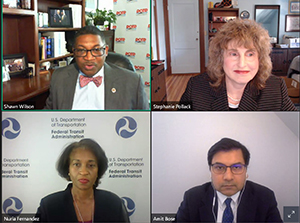
Shawn Wilson (clockwise from top left), Stephanie Pollack, Amit Bose and Nuria Fernandez. (Transport Topics)
“There are lots of ways to reduce carbon intensity of the transportation sector and given the urgency of the climate crisis, we should be working on all of them,” Pollack said. “Transporting more people and freight by rail also offers significant opportunities to reduce fuel consumption and carbon emissions. There’s a real opportunity to reduce carbon from the total logistics footprint.”
Buttigieg said the administration will focus on a COVID-19 relief package before tackling comprehensive infrastructure legislation. President Joe Biden has proposed a $1.9 trillion economic aid package to assist with COVID-19 recovery. The package would dedicate $20 billion for transit operations, many of which have been struggling during the pandemic.
“It’s critically important that we complete this first step now,” Buttigieg said. “When we come to [the recovery] step, I think infrastructure will be at the absolute core of the kind of job-creating investments that the president is focused on tackling. How you can get vaccinated if you can’t get where you need to be?”
Formerly mayor of South Bend, Ind., Buttigieg said DOT will serve as a partner to state and local government agencies. He stressed the importance of being accessible to small government agencies that do not have a dedicated person on staff to handle state or federal government relations.
“I want it to feel like our door is open to be user-friendly to those smaller communities,” Buttigieg said. “We’ve got to be flexible enough in our approach that we’re really supporting local and state leaders. We are so eager to partner on the road ahead. The solutions will not come from here in Washington, but the support should.”
Want more news? Listen to today's daily briefing below or go here for more info:


